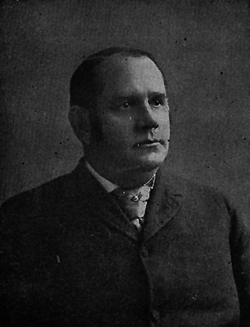The Republicans, Mark Hanna, and Labor
by Spence Holman, Vassar '99
Mark Hanna, as McKinley's campaign manager, has been championed as both a revolutionary and an opportunist. The truth lays between the two. Hanna brought to the campaign an extensive knowledge of business and its practices, which complemented McKinley's familiarity with the political world. Hanna took advantage of this combination and ran a tight, well-ordered campaign utilizing his and McKinley's skills to their highest potential.
It was Hanna's involvement with business, though, that created the loudest outcry. As a businessman before his involvement with politics, Hanna was seen both as a friend to the working class and as their worst enemy. In Hanna's biography, Herbert Croly states that if an employee had a grievance, Hanna "always heard patiently and considered fairly what they had to say." His peers found him to be kind and reasonable in his dealings with laborers, as well as open to suggestions and ideas from them. Yet others did not see this side and characterized Hanna as anti-union and anti-workingman. His labor record was reviewed by the Central Labor Union and the Labor Congress and found to be unsatisfactory.
The Republican Party took a moderate stance on labor. In their platform, only one section specifically mentioned the worker: "We favor the creation of a National Board of Arbitration to settle and adjust differences which may arise between employers and employed engaged in inter-State commerce." They wanted to avoid situations such as the Homestead and Pullman strikes, which cast an unfavorable light on both sides of the picket line. Hanna is quoted as telling labor: "Don't organize in the spirit of antagonism; that should be beneath your consideration." The workers were expected to behave themselves and solve their problems with employers in a business-like manner.
This policy, on paper, sounded good. But the Republicans did not hold true to their words. Hanna's fundraising campaign focused on two main cities-- Chicago and New York. It was there that he found the majority of his money for McKinley. The donations came from men such as Carnegie and companies such as Standard Oil. These prominent business men and institutions did not want any violence either, and were thus willing to support the Republicans.
Hanna's willingness and desire to take money from such interests contradicted the idea of fairness the Republican Party was trying to display. The working class was not willing to trust or vote for a party which did not respect the wage earner's interests. Hanna's debatable reputation as a friend to unions did not help the party's image either. His prominence as a Republican leader forced these contradictions to the forefront of the campaign, leaving many in doubt as to his and the party's true feelings towards the labor vote.

"Secretary Bausch of the Central Labor Union yesterday read to that body a letter that he had received from the Cleveland Central Labor Union in regard to the labor record of Marcus A. Hanna. The Secretary of the Cleveland Central Labor Union wrote that Mr. Hanna had wrecked the Seaman's union of the lower lake regions, that he had smashed the union of his street railway employees, and refuses to allow them to organize. Further, Mr. Hanna had assisted in destroying the mineworker's unions of Pennsylvania, and had tried to break up the carpenter's unions of Cleveland by employing non-union men on his mansion at a critical time last Spring, when the eight-hour law was being put into effect."
--New York Times, 7 September 1896
"The Republican party stands for honest money and the chance to earn it by honest toil."
--William McKinley, in The Republican Campaign Textbook, 1896
"Don't organize for any other purpose than mutual benefit to the employer and the employee. Don't organize in the spirit of antagonism; that should be beneath your consideration. If you are the stronger or the abler, much less excuse you have to show resentment, because the other side is simply asking that they have their share...If we can by any method establish a relation of mutual trust between the laborer and the employer, we shall lay the foundation stone of a structure that will endure for all time...It is all wrong to suppose that the laboring element of this country is not ready and willing to join in this movement. I speak from experience. I have found the labor organizations ready and willing to go more than half way."
--Mark Hanna, quoted by Samuel Gompers in Labor and the Employer,1920
SOURCES
Croly, Herbert. Marcus Alonzo Hanna: His Life and Work. New York: Macmillan, 1912.
Gompers, Samuel. Labor and the Employer. New York: E.P. Dutton and Company, 1992.
